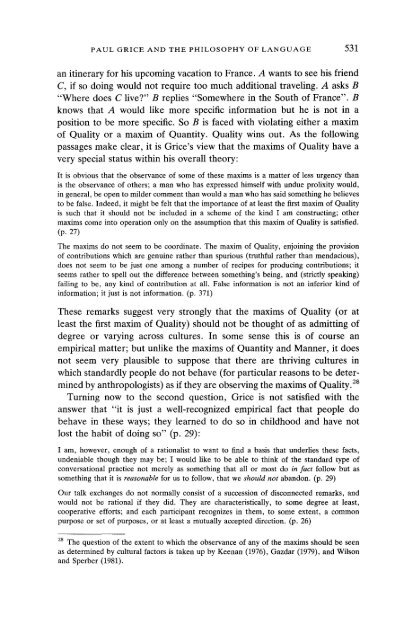Paul Grice and the philosophy of language
Paul Grice and the philosophy of language
Paul Grice and the philosophy of language
You also want an ePaper? Increase the reach of your titles
YUMPU automatically turns print PDFs into web optimized ePapers that Google loves.
PAUL GRICE AND THE PHILOSOPHY OF LANGUAGE 531<br />
an itinerary for his upcoming vacation to France. A wants to see his friend<br />
C, if so doing would not require too much additional traveling. A asks B<br />
"Where does C live" B replies "Somewhere in <strong>the</strong> South <strong>of</strong> France". B<br />
knows that A would like more specific information but he is not in a<br />
position to be more specific. So B is faced with violating ei<strong>the</strong>r a maxim<br />
<strong>of</strong> Quality or a maxim <strong>of</strong> Quantity. Quality wins out. As <strong>the</strong> following<br />
passages make clear, it is <strong>Grice</strong>'s view that <strong>the</strong> maxims <strong>of</strong> Quality have a<br />
very special status within his overall <strong>the</strong>ory:<br />
It is obvious that <strong>the</strong> observance <strong>of</strong> some <strong>of</strong> <strong>the</strong>se maxims is a matter <strong>of</strong> less urgency than<br />
is <strong>the</strong> observance <strong>of</strong> o<strong>the</strong>rs; a man who has expressed himself with undue prolixity would,<br />
in general, be open to milder comment than would a man who has said something he believes<br />
to be false. Indeed, it might be felt that <strong>the</strong> importance <strong>of</strong> at least <strong>the</strong> first maxim <strong>of</strong> Quality<br />
is such that it should not be included in a scheme <strong>of</strong> <strong>the</strong> kind I am constructing; o<strong>the</strong>r<br />
maxims come into operation only on <strong>the</strong> assumption that this maxim <strong>of</strong> Quality is satisfied.<br />
(p. 27)<br />
The maxims do not seem to be coordinate. The maxim <strong>of</strong> Quality, enjoining <strong>the</strong> provision<br />
<strong>of</strong> contributions which are genuine ra<strong>the</strong>r than spurious (truthful ra<strong>the</strong>r than mendacious),<br />
does not seem to be just one among a number <strong>of</strong> recipes for producing contributions; it<br />
seems ra<strong>the</strong>r to spell out <strong>the</strong> difference between something's being, <strong>and</strong> (strictly speaking)<br />
failing to be, any kind <strong>of</strong> contribution at all. False information is not an inferior kind <strong>of</strong><br />
information; it just is not information. (p. 371)<br />
These remarks suggest very strongly that <strong>the</strong> maxims <strong>of</strong> Quality (or at<br />
least <strong>the</strong> first maxim <strong>of</strong> Quality) should not be thought <strong>of</strong> as admitting <strong>of</strong><br />
degree or varying across cultures. In some sense this is <strong>of</strong> course an<br />
empirical matter; but unlike <strong>the</strong> maxims <strong>of</strong> Quantity <strong>and</strong> Manner, it does<br />
not seem very plausible to suppose that <strong>the</strong>re are thriving cultures in<br />
which st<strong>and</strong>ardly people do not behave (for particular reasons to be determined<br />
by anthropologists) as if <strong>the</strong>y are observing <strong>the</strong> maxims <strong>of</strong> Quality. 2s<br />
Turning now to <strong>the</strong> second question, <strong>Grice</strong> is not satisfied with <strong>the</strong><br />
answer that "it is just a well-recognized empirical fact that people do<br />
behave in <strong>the</strong>se ways; <strong>the</strong>y learned to do so in childhood <strong>and</strong> have not<br />
lost <strong>the</strong> habit <strong>of</strong> doing so" (p. 29):<br />
I am, however, enough <strong>of</strong> a rationalist to want to find a basis that underlies <strong>the</strong>se facts,<br />
undeniable though <strong>the</strong>y may be; I would like to be able to think <strong>of</strong> <strong>the</strong> st<strong>and</strong>ard type <strong>of</strong><br />
conversational practice not merely as something that all or most do in fact follow but as<br />
something that it is reasonable for us to follow, that we should not ab<strong>and</strong>on. (p. 29)<br />
Our talk exchanges do not normally consist <strong>of</strong> a succession <strong>of</strong> disconnected remarks, <strong>and</strong><br />
would not be rational if <strong>the</strong>y did. They are characteristically, to some degree at least,<br />
cooperative efforts; <strong>and</strong> each participant recognizes in <strong>the</strong>m, to some extent, a common<br />
purpose or set <strong>of</strong> purposes, or at least a mutually accepted direction. (p. 26)<br />
28 The question <strong>of</strong> <strong>the</strong> extent to which <strong>the</strong> observance <strong>of</strong> any <strong>of</strong> <strong>the</strong> maxims should be seen<br />
as determined by cultural factors is taken up by Keenan (1976), Gazdar (1979), <strong>and</strong> Wilson<br />
<strong>and</strong> Sperber (1981).














